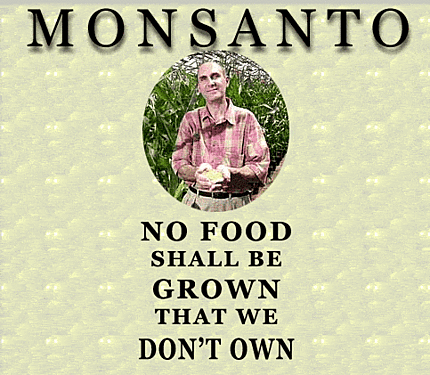
Image: Educate-yourself.org
Seven US states are investigating market abuse by seed giant Monsanto. Attorneys general in Ohio, Texas, Virginia, Iowa, Illinois, and two more states are investigating Monsanto’s competitive practices. The US Justice Department is also investigating marketing at Monsanto. Bloomberg has more on Monsanto’s brewing storm:
Monsanto rose to dominance via its genetically engineered Roundup Ready seed line, which was in 93 percent of the soybeans and 82 percent of the corn produced in the U.S. last year. The gene Monsanto adds to the seeds allows crops to withstand use of its Roundup weed killer.
The states are probing whether Monsanto violated any laws by offering rebates to distributors for excluding rival seeds, imposing limits on combining the product with other genetic enhancements, or offering cash incentives to switch farmers to a more-expensive generation of seeds, according to one person involved in the probe who asked not to be named because he isn’t authorized to discuss it.
The five states known to be part of the inquiry accounted for almost 39%, or $31 billion, of U.S. corn and soybeans last year, based on U.S. Department of Agriculture data. A state- level investigation, on top of the federal one, “can lengthen the lawsuit and potential settlements, and it can increase uncertainty and costs for Monsanto,” said Daniel Sokol, a law professor at the University of Florida in Gainesville who edits a blog on antitrust and competition policy.
Of Monsanto’s $11.7 billion in revenue in the fiscal year ended Aug. 31, 2009, $7.3 billion came from sales and licensing of seeds and seed genes. Revenue grew by an annual average of 17% from 2004 to 2009, as earnings expanded eight-fold to $2.11 billion, driven by genetically engineered products and acquisitions of other seed companies.
Monsanto will take part in a hearing on March 12, the first of a series of government-sponsored hearings on agriculture and competition, according to Bloomberg. The Monsanto hearings are part of a torrent of regulator activity on big agriculture.
Monsanto CEO Hugh Grant (yes, you heard right) is accustomed to these kinds of investigations. According to the Ft. Wayne Journal Gazette,
The legal and public relations fights are the latest battles for the Scotland native (Hugh Grant) who rose from demonstrating weed killer in barley fields to the company’s top executive in his 29 years with Monsanto.
Grant resolved intellectual property disputes early in his tenure as CEO, settling patent lawsuits with Bayer, Syngenta and Dow Chemical by agreeing to cross-license technologies. The United States abandoned an antitrust probe focused on its herbicide in 2004.
The company said it’s working to help double food production by 2050 as the planet’s population reaches 9 billion and portrays itself as a friend of farmers with its americasfarmers.com Web site.
If history repeats itself, the Feds, state officials, farmers, and companies (mainly DuPont) supporting the latest wave of allegations are going to have a tough time getting anything out of Monsanto.
If you’re like me and find Monsanto’s behavior both problematic and dangerous, I encourage you to sign a petition here.
